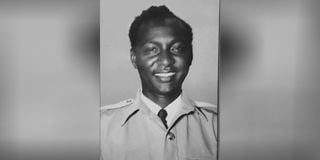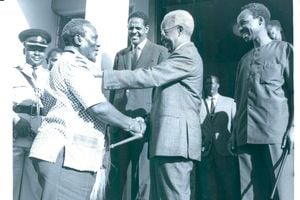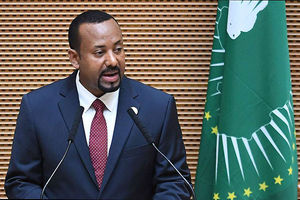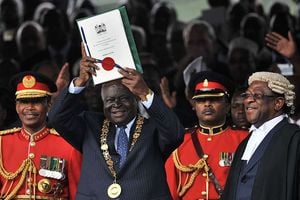
David Wabera, a former provincial administration officer. Wabera Street in Nairobi is named after him.
My name is MERVYN MACIEL. As I approach my 95th birthday, and since my memory is still intact, I thought it would be a good idea to remember some of the people I met during my almost 20 years of service in Kenya.
My parents were originally from Goa but I was born in Nairobi. My mother, Josephine Maciel, died at childbirth while my father Mathias Maciel, stepmother and three young siblings, were the victims of the ill-fated ship S.S. Tilawa (sometimes referred to as the forgotten Indian Titanic), sunk by the Japanese Navy in 1942 during World War II.
I became an orphan overnight together with my two brothers Joseph Maciel (later a reverend) and Wilfred Maciel. Wilfred was a well-known Kenyan personality. He was a one-time advertising manager of East African Airways and later marketing executive of Serena Lodges and Hotels. Wilfred was also the first non-white freelance journalist to interview Mzee Jomo Kenyatta at Maralal.
I joined the colonial-era Kenyan Civil Service in 1947, working mostly in the provincial administration in various districts. I started as a clerk and left as an executive officer in the Ministry of Agriculture. Over the years I worked in Mombasa, Voi, Kisii, Lodwar, Marsabit, Kitale and Kapenguria among others.
I currently live in the United Kingdom and I am also the author of two books: ‘Bwana Karani ‘(1985) and ‘From Mtoto to Mzee’ (2014). One of the most remarkable Kenyans I met and worked with from 1949 was Daudi Dabasso Wabera. It is a friendship I still cherish 75 years later — and 61 years since his death.
*****
It is quite possible that some readers may be unaware of the significance of the name, so let me try and introduce a former colleague and friend after whom Wabera Street in Nairobi city centre is named: Daudi Dabasso Wabera, a son of Marsabit.
I first met Wabera (I preferred to call him David) when I was posted from Turkana to Marsabit in late 1949. I was very much impressed by this young man who came from the Gabra ethnic group. He had clear cut features, a pleasant manner, and impressed me with his fluent English.
In addition, he was a linguist of sorts as he could also converse in Kiswahili, Borana, Burji, Rendille and a smattering of Kikuyu and Somali. These gifts of his came in handy whenever the District Commissioner’s interpreter was not available.
I was posted to Marsabit as District Clerk and Wabera was to be my assistant — and a very efficient assistant he turned out to be. He had studied at Kahuhia Church Missionary Society School until 1939 and also at the Bible Churchmen’s Missionary Society (BCMS) — an evangelical Anglican missionary society now known as Crosslinks — mission in Marsabit. Because of his connection with the BCMS mission in Marsabit, I had assumed all along that he was a Christian. This turned out not to be the case as you will see from my explanation later in this article.
I found Wabera to be a willing worker who could be trusted to deal with routine administrative matters and also the odd issues that arose from time to time. We both got on very well and he was initially pleased to be working in his own area. He had a very pleasant personality. Being a local man, he knew his people well and was a great help to me whenever problems arose.
However, all this was to change months later when he approached me requesting a transfer as he found it difficult to cope with the increasing demands of the family. He had too many ‘relatives’ and was finding life difficult. Being the sole breadwinner, there were a lot of demands on him, and he was finding it increasingly tough to cope.
I also found that this was affecting his performance at work adversely. I reluctantly agreed to his request knowing how much I was going to miss him. In a way, I sensed he too was disappointed at having to move from his own area, but in the circumstances, there was no alternative.
From the feedback I was receiving, I got the impression that Wabera was not happy at Wajir, where he had been moved. He was obviously missing his family and the wider community he used to know. As I’ve said earlier, I was always under the impression that Wabera was a Christian.
It is only during the season of Ramadan that I noticed he had brought a pot which he had placed on the floor to collect his sputum. I realised then that he must have been a devout Muslim to observe his fast so strictly!
My next contact with Wabera was many years later, when he had entered the administrative officer ranks and was posted as a District Officer (DO) in Malindi. At about the same time my family and I had planned a holiday there with a couple of friends. Unfortunately, the place we had rented was left in a bad state and needed a lot of tidying up.
Who should come to my assistance but Wabera? On hearing of our plight, he immediately sent a team of prisoners and, in no time, had the house restored to its former glory.
I was very grateful for his timely help and assurance that I could call on him if ever I needed any further assistance. This was his character - always ready to help someone in need. I appreciated this attitude of his very much.
Years went by and I had moved on promotion from Marsabit to South Nyanza, and finally on further promotion to the Ministry of Agriculture. I was initially posted to the provincial agricultural headquarters at Machakos, later moving to the plant breeding research station at Njoro.
It was here that I received a letter from Wabera telling me of his joy at being selected to go on an administrative officers’ course in England. He must have done well at the interview, and I was later told that he was being posted as DC Isiolo — quite a prime posting.
This must have been something beyond his wildest dreams and I felt sure he was delighted over this change of events. I was thrilled with this news and immediately wrote to congratulate him. Fortunately, the family had saved my letter which, thanks to the help of my friend Woche Guyo in Marsabit, I got hold of recently.
I regret not retaining Wabera’s response because. unfortunately, at the time of our leaving Kenya for the United Kingdom, I had to get rid of quite a lot of my accumulated correspondence. To this day, I regret not retaining his reply.
Kenya was preparing for independence at the time and people were delighted that they would soon be tasting the fruits of Uhuru! It was a short while after Kenya’s independence that news reached me on June 28, 1963 that Wabera, along with Chief Haji Galma, had been assassinated while on a peace mission in the Isiolo District — sanctioned by Prime Minister Jomo Kenyatta (later President).
A section of the Somalis were agitating for secession from Kenya at the time, and sadly Wabera became a victim and martyr of Kenya’s independence.
His death at such a young age was a great loss to Kenya and his family. I, too, mourned for him as we were close friends. In my own heart, I felt that Kenya had lost a young and promising son.
Although Wabera is sometimes referred to as ‘the forgotten Son of Marsabit’. he is still remembered by many who come to pay their respects at his grave – among them being my good friend, Woche Guyo, who is an authority on Marsabit and its peoples.
Many years ago he was interviewed by the BBC Oromo Service on Wabera. Later, I also learnt, again from Woche Guyo, that Mzee Solomon Ginna Addo was the policeman whose responsibility was to guard the body of Wabera when it was taken to Meru for post mortem
I shall never forget my friendship with Wabera, and was disappointed that he was not allowed to make a contribution to the country as he would have wanted to.
However, I was pleased to see him honoured by the Kenya government who later named Wabera Street in Nairobi city centre after him. It is a fitting tribute to a loyal and great son of Kenya and a friend I shall never forget.








